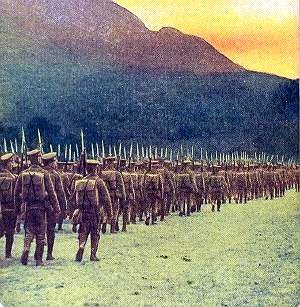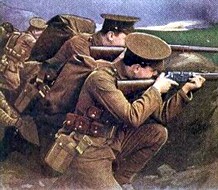|
A soldier's tale AS TOLD BY PRIVATE RICHARD
DOWNES SERVING IN FRANCE
There are many stories of life at the front during the Great War, mostly written home in letters to family and friends or given in newspaper interviews and they survive as a graphic reminder of the hardship and terror experienced by our troops at this time. One of the most detailed of these accounts came from Richard Downes, of North Street, Bourne, who was a private with the 2nd South Lincolnshire Regiment. He was injured early in the war while serving at La Basse in France, sustaining wounds from a bursting shell and was invalided home to stay with his sister, Mrs Collins, then living in the Austerby at Bourne where he was interviewed by the Grantham Journal and their report was published on Saturday 19th December 1914. Private Downes takes up the story which he tells with such detail that we can imagine not only the monotony of life at the front but also the horror of the war and the dreaded suspense of waiting for the unexpected to happen: On August 10th, our regiment left Southampton for the front. On landing, we marched two miles to encamp. The next morning we entrained for a village six miles this side of Mons, remaining there till the next day, when we marched to a village within two miles of Mons. We had been there barely two hours when the call came to fall in with full marching order. At that minute, no one suspected it was for digging trenches for the attack upon the enemy until we reached the firing line. Men and boys came out of the village to dig. We had just finished when the enemy sent their first shell over. The civilians took this very calmly but when the second shell burst they were quickly out of sight. This was about 3.30 pm and the firing continued without intermission until about 11 pm. We then had the chance to get a wink of sleep while the sentries kept watch. About 4 am, they let us know it was time to be on the alert, as they started shelling, which was kept up heavily. Shame to say, they were not satisfied with shelling our trenches but they shelled the villages around Mons, setting churches and houses on fire. About eight o'clock, the enemy's infantry opened a heavy rifle and shell fire upon us. As soon as it eased off a little, we started to have a go at them with our rifles. At eleven o'clock, we received the order to retire out of our trenches, and this we did with only what we stood up in. That day we retired thirty-six kilometres. Being unable to find our camping ground, we slept on the roadside for the night. The next morning, we were again on the move and had another sharp attack against the enemy, checking their advance. That day we marched thirty-two kilometres and next morning we took up a position on the east side of the town. From 5.30 am until 3 pm there was continuous fierce fighting. We then retired through the town, taking up a position upon the other side where we had two hours more of fierce fighting. We finished up with a bayonet charge. The following morning we received orders to retire in the centre of the two flanks, without firing or taking up a position. In the fortnight we had covered a distance of 286 miles and the men, with this long retirement, were getting a little downhearted. THE ADVANCE But on the morning of the advancement everyone had a smile. We started singing the old favourites, "It's a long, long way to Tipperary", and other songs, until the officer gave orders for all to be quiet as we were near the enemy. It was not long before we came upon them in a village called Sancy. We drove them clean out. They left behind many wounded and dead. There had not even time to take the food they were cooking for the day's meal. We stayed the night at Sancy, and the next day advanced to Brailey and in the action there we captured 500 prisoners, the enemy's losses in killed and wounded being very great. Here again we had caught the enemy napping. They had not suspected us being so hot on their track. Indeed, they had to leave behind the harness on the horses killed and their transport wagons, amongst which were two they had captured from us a Mons. “Our outposts were put out for the night, the remainder billeting in the village. The following morning we marched to Brain, where fighting again took place, though not quite so heavy as on the previous day. BATTLE OF THE AISNE BRIDGE That night we rested in the fields. Early next morning we marched on, with the intention of crossing the bridge over the Aisne, but throughout the fight the enemy was shelling the bridge so severely that we did not force a passage until 7 at night when the Wiltshires and Lancashires effected the crossing. The shelling immediately re-opened, and the remainder did not cross until the morning. Those of us who had first succeeded in crossing had a very rough experience: we had the full force of the enemy's rifle fire, as they were trying all the time to close in on us. They failed in their attempts, as we kept up a heavy rifle fire and our gunners, too, were keeping up on them a heavy shell fire. We did not lose a man and we had none wounded. During the morning, the rest of the division got across. The firing line was now joined on the left and right of the other division. Our division took up a distance of three miles in length when in a line. The South Lancashires took their places as supports to the third division. The position we took up was the side of the road, taking the side nearest to the firing line for cover. TRENCHES There we dug ourselves in and made bomb proof trenches, with plenty of room so that we could even lie down in them if there was a chance to sleep. The shelling from the enemy's guns was very heavy every day. Repeatedly, their infantry tried to break through. We had to go out twice and support the firing line, on each occasion losing several men. The last time we went out, I was one detailed to carry the wounded in during the continuance of the firing. Whilst carrying in a wounded officer one of our men was shot through the middle of the head, death being instantaneous. This was the work of a sniper. We found him hidden in a tree firing. It was not long before our rifles brought him down. During this attack the enemy turned their own machine guns on 60 of their own men who were about to surrender. All the 60 were killed. SIGHT OF BATTLEFIELD On the Monday morning, I was asked to bring in the body of an officer who was killed on the Sunday. I knew where he lay. I shall never forget the sight on the battlefield, so many poor fellows lying dead in all postures. When we got to where our officer lay, we found that already the enemy had searched his body and had taken away all he had on him, even wrenching the rings off his fingers. We remained in the trenches for three weeks, when we were relieved by the Second Division. We retired six miles to the rear of the firing line, and we were billeted for a few days. Then the order came for us to go on to our left flank. We had five nights of marching, one night in the train, and one night in the motor cars. This brought us to within two miles of Bethune where we joined the French firing line. We soon had a warm reception from the enemy, but we were able to check them. We were now close to La Bassee. On entering the village, I saw a man who had been shot because he refused to take up arms against his own countrymen. This was done in the sight of his wife and mother who told us about it when we went to get some water. The poor women were at first frightened at us. But when they found we were English, the poor things welcomed us. I spent my last night in the trenches in La Bassee. It is a night I shall remember as long as life lasts. It was a night of terror. The Huns trained their big guns on to our trenches. Their searchlights were flaring on us and a terrific infantry fire was kept up. The next day I was wounded in the left arm. I am sorry to say our regiment had lost in killed and wounded about 800 men and 36 officers, up this time. I can say from experience that the men get good food out at the front.
NOTE:
Private Darnes made a good recovery from his wounds and rejoined
ILLUSTRATIONS of World War One reproduced from Bamforth postcards
Go to: Main Index Villages Index |

